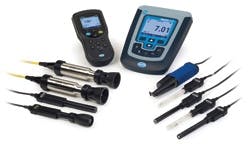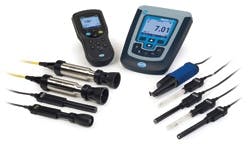Pump Lift Station Maker Turns to Composites to Avoid Corrosion
• Components such as manway flanges and top and bottom covers that use composite materials offer advantages on corrosion, chemical and atmospheric resistance.
Topp Industries Inc. is a leading manufacturer of lift stations and components used to move wastewater from homes, commercial buildings and other inhabited structures to treatment facilities.
Steel, Concrete Limits
Many companies in the wastewater treatment industry make their products out of steel and concrete. But steel is highly susceptible to corrosion caused by various chemicals in the wastewater stream. This tendency for corrosion is often accelerated by chloride-rich environments, such as areas with natural salt water concentrations – ultimately shortening the life spans of these lift stations Concrete stations tend to crack as they settle, resulting in leakage and typically higher maintenance costs. Both steel and concrete stations also are extremely heavy, making them difficult to transport and install.
As for stations composed of both steel and concrete, the concrete will inevitably crack over time, allowing chlorides to reach and corrode the steel. When steel corrodes it expands, causing it to lose its bond to the adjacent concrete, often limiting the total life cycle of the list station or worse, resulting in failure of the structure.
These problems can be solved by using composite materials consisting of fiberglass reinforcement in a polymer resin. But open spray-up and many of the older fiberglass manufacturing technologies are slow and labor-intensive.
Composite Options
Topp Industries, of Rochester, IN, avoids these problems, in part, by making lift station components such as manway flanges and top and bottom cover plates out of thermoset bulk molding compound (BMC) and sheet molding compound (SMC). BMC and SMC provide excellent corrosion, chemical, and atmospheric resistance, helping Topp’s lift stations last far longer than similar steel units. In addition, BMC and SMC lift station components don’t crack in the field like those made of concrete. In most cases, thermoset components are significantly lighter than concrete and steel parts of equal strength. Also, the closed molding process used to make thermoset parts is much more environmentally friendly than open composite-manufacturing processes.
Quicker, Lighter
Closed molding turns out finished composite parts in minutes, compared to hours for open spray-up processes, significantly reducing manufacturing cycle times and labor requirements. In addition, concrete basins made by other firms in the industry weigh several tons, requiring heavy equipment, large quantities of fuel and considerable human effort to transport the units and handle them on the job site. But thanks in part to its relatively light BMC and SMC components, Topp lift stations are easy to move and handle, minimizing labor, equipment and fuel requirements. Once in place, the corrosion-resistant stations last at least seven times longer than steel tanks and don’t require repairs to fix settlement cracks and other problems that affect concrete units.
Topp does make some products out of steel and cast iron. But with higher fuel prices, the cost of the casting process has risen significantly in recent years. With this added incentive, it plans to make even less use of metals – and more of composites – in the months and years to come.
IDI Composites International is based in Noblesville, IN. With manufacturing facilities in Europe, Asia and the Americas, it provides customized polyester/vinylester-based bulk molding compounds (BMC) and sheet molding compounds (SMC) for markets that include automotive, electrical, appliance, food service, energy and water. Contact: 317-773-1766, [email protected] or www.idicomposites.com

